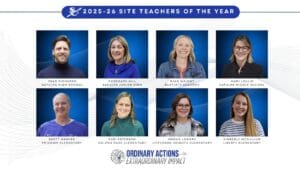At Monday evening’s Board of Education meeting, Donia Doudican, SPS Executive Director of Teaching and Learning, and Amy Riff, Director of Accountability and Accreditation, gave reports on the district’s $5,289,451 in ARPA/ESSER (Elementary and Secondary School Emergency Relief) III funds from the federal government and their drafted plans to spend the money before the 2023 deadline.
Phase 1 of the plan is titled “An Investment in Early Literacy,” and administrators stressed that, “reading is the portal to learning, therefore, students cannot achieve their best until they are skilled readers.”
Doudican and Riff said that through their research and analysis of yearly testing data they have discovered that “If a student is not reading by the 3rd grade, it’s going to be really difficult for them to catch up.”
Riff presented 2021 OSTP (Oklahoma School Testing Program) ELA (English Language Arts) Performance data for grades 3rd through 9th, and then isolated the 3rd grade, district-wide, which shows that 44% of those students fall in the lowest-performing category of “Below Basic.”
She emphasized that “Literacy is so important to proficiency on any of the tests” across all grades, “because they are all really heavy in reading, even math and science.” The question is, “How do we move that trend upward?”
One way SPS intends to increase reading proficiency is through its new Early Literacy Plan for pre-k through 3rd grades, which includes new Standards, new Curriculum, Tier 1 instruction, Additional Personnel, Professional Development.
Several other tactics and strategies to improve academic success were introduced, and Superintendent Rob Armstrong said the Board can expect to see the overall plan in its entirety in December, before it is submitted to the State for final approval for funding.
School Board President Steve McCormick remarked, “I am 100% behind this plan…We need to be on top of this so we know if a student falls behind and we can move accordingly quickly.”
Doudican underscored the importance of these improvements to the future of the district and its students, saying, “Anywhere from 40 to 60% of our students need this intensive work—we need to reduce class sizes, we need more interventionists and specialists. We’ve really got to figure out what students need, when they need it, and to take care of it right then. We have programs—we just need more help—intensive intervention. We can’t continue to add things to our teachers’ plates. Our teachers are working very hard.”
She concluded, “Never before have we had an opportunity like this. It’s something we have to capitalize upon. We have been given a gift. We need to invest our ARPA money, and not just spend it. Teaching these kids to read well, that’s the gift we need them to leave with.”







